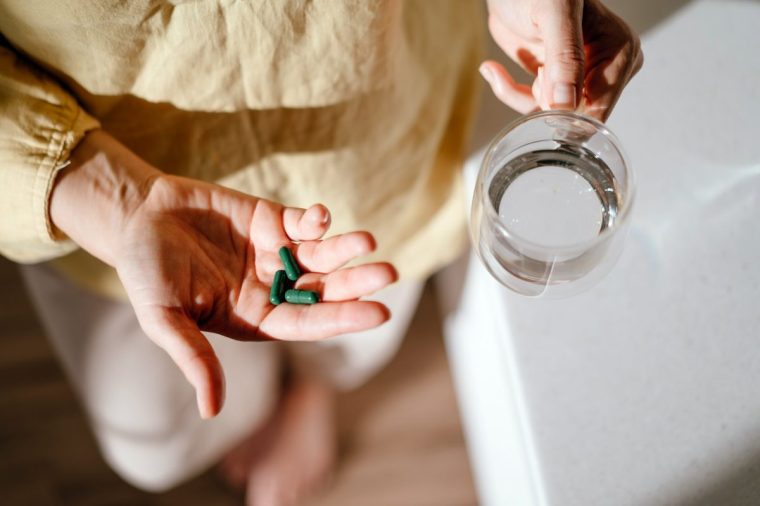In an endless sea of supplements, it can be difficult to separate the science from the marketing noise – experts reveal which ones, if any, are worth the hype
Navigating the booming world of supplements can be overwhelming. And the constant wave of trendy new ingredients doesn’t make it any easier.
Every so often a new “miracle” powder or capsule is hyped across social media and news articles, leaving us more confused than informed. These so-called wellness fixes are praised for all sorts of benefits, from boosting energy levels to balancing hormones and even helping us focus.
But with so many products flooding the market, it’s difficult to separate the science from marketing noise and know which, if any, are actually worth adding to your daily routine.
“It’s worth remembering that supplements are exactly that – a supplement to your diet,” says Claire Hitchen, a nutritionist registered with the British Association for Nutrition and Lifestyle Medicine.
“They shouldn’t be relied upon as a food replacement. But in today’s busy world and with some people avoiding certain foods due to dietary constraints, it can be hard to hit all your necessary nutrients – sometimes you need a little helping hand.” Hitchen reveals that the only supplements she takes are Omega 3, vitamin D – in a spray – and a good quality multivitamin.
So are these new supplements worth the hype? Experts advise seeking advice from a health professional if you are considering starting a new supplement, especially if you are pregnant or have any existing health condition.
Sea Moss
Available in capsule, gel and gummy form, sea moss is a red algae sourced from coastlines on North America, Europe and the Caribbean Islands.
“Sea moss contains small amounts of vitamins and minerals such as iron and magnesium and it’s rich in iodine, which supports thyroid function,” says Nichola Ludlam-Raine, dietitian and author of How Not To Eat Ultra Processed.
 Experts say supplements shouldn’t replace a nutritious diet but can be a ‘helping hand’ (Photo: Fiordaliso/Getty)
Experts say supplements shouldn’t replace a nutritious diet but can be a ‘helping hand’ (Photo: Fiordaliso/Getty)
A healthy thyroid is important for everything from our heart rate, metabolism, circulation and even bone health.
The NHS says adults need 140 micrograms (mcg) of iodine a day with 600 mcg being the recommended upper daily limit for iodine in adults.
“Sea moss is generally deemed safe, but discuss with a doctor before taking it as a supplement. The British Dietetic Association recommends seaweed is not eaten more than once a week, as too much can cause digestive upset or even hyperthyroidism due to the high iodine content,” explains Emily Foster, nutritionist at Holland & Barrett. In particular, people with specific thyroid conditions should only take sea moss under the guidance of a healthcare professional.
Hyperthyroidism – an overactive thyroid – causes mood swings, nervousness and a fast heart rate.
“Sea moss can also be contaminated with heavy metals, so we can’t always be sure of the quality of supplement products,” says Hitchen.
She adds: “I would usually advise sticking to food sources of iodine instead such as seafood and seaweed, eggs and dairy.”
Lion’s mane
Functional mushrooms such as lion’s mane are having a major moment, added to the labels of shots, coffees and supplements.
Lion’s mane is a mushroom named after its large, white, shaggy appearance that is said to support brain health. It can be taken in powder or capsule form.
Research in the journal Frontiers in Ageing Neuroscience found that people with mild Alzheimer’s disease who took 1g of lion’s mane mushroom daily for 49 weeks showed significantly greater improvements in cognitive test scores compared to those given a placebo.
Research on mice published in the International Journal of Molecular Sciences suggested it could reduce symptoms of anxiety and depression, but more research is needed to confirm any benefits in humans.
“Lion’s mane doesn’t seem to improve overall brain function across the board or benefit younger people,” says Hitchen.
“More robust research is needed before recommending routinely,” adds Ludlam-Raine.
Berberine
Berberine, a plant compound extracted from several herbs, has attracted attention for its purported effects on blood sugar and metabolism, and even been dubbed “nature’s Ozempic”.
“There’s good evidence from clinical studies to suggest taking berberine every day could lower blood sugar levels (both fasting and long-term) by up to 20 per cent, particularly when taken with other diabetic medication,” says Hitchen.
“This has been seen in doses of 600 to 2,700mg a day. Research suggests its glucose-lowering benefit is as effective as some medication, such as metformin, a type-2 diabetes medication.”
Research in the journal Life also found that berberine could help to improve hormonal health in women with PCOS, potentially helping with fertility.
But berberine doesn’t come without side effects.
“Gastrointestinal symptoms (nausea, constipation and diarrhoea) are common, especially in higher doses. Berberine can also interact with medications including blood thinners and certain diabetes drugs.”
If you suffer from insulin resistance or high cholesterol you may benefit, but Nichola warns that berberine should always be taken under supervision of a healthcare professional due to potential interactions.
Cordyceps
Another functional fungi, cordyceps have been used for centuries to support stamina and immunity (it’s also the inspiration for the fictional fungal brain infection in the TV series The Last Of Us). Some early animal studies and lab studies suggest it might have anti-inflammatory effects – and one paper linked it to improved exercise capacity – but experts say evidence remains at a very early stage.
Ludlam-Baine says she wouldn’t recommend cordyceps in her clinic – though athletes or very active individuals seeking performance support may benefit from taking 1 to 3g daily.
While it is generally well tolerated, “it can cause dry mouth, diarrhoea and nausea,” she warns.
Colostrum
A highly concentrated form of breast milk, colostrum is the first milk produced by mammals – including humans – right after giving birth. It’s nutrient rich, and highly beneficial for newborn babies, but should adults take it in a supplement?
“Colostrum is designed to support immature digestive and immune systems, to promote growth and give babies protection against disease,” says Hitchen. “So when adults supplement colostrum, our fully-formed digestive systems will just break down these growth factors and enzymes before they reach our bloodstream. So, without these benefits, it’s similar to just supplementing whey protein.
“Therefore, I wouldn’t recommend it as a supplement for any adults.”
Shilajit
Pronounced shee-luh-jeet, this is a tar-like, mineral-rich substance found in the Himalayas. It’s used in traditional Ayurvedic medicine, a holistic healing system dating back thousands of years.
Shilajit contains an antioxidant known as fulvic acid. “Shilajit is claimed to have antioxidant, antimicrobial and immune-supportive properties. But research in humans is limited to a small number of relatively low quality studies,” says Hitchen.
“There can also be variability in the quality and processing of shilajit supplements, so there could be a risk of a product having heavy metals or other possibly harmful toxins.”
Ludlam-Baine agrees that “caution is strongly advised due to purity and safety concerns”.

